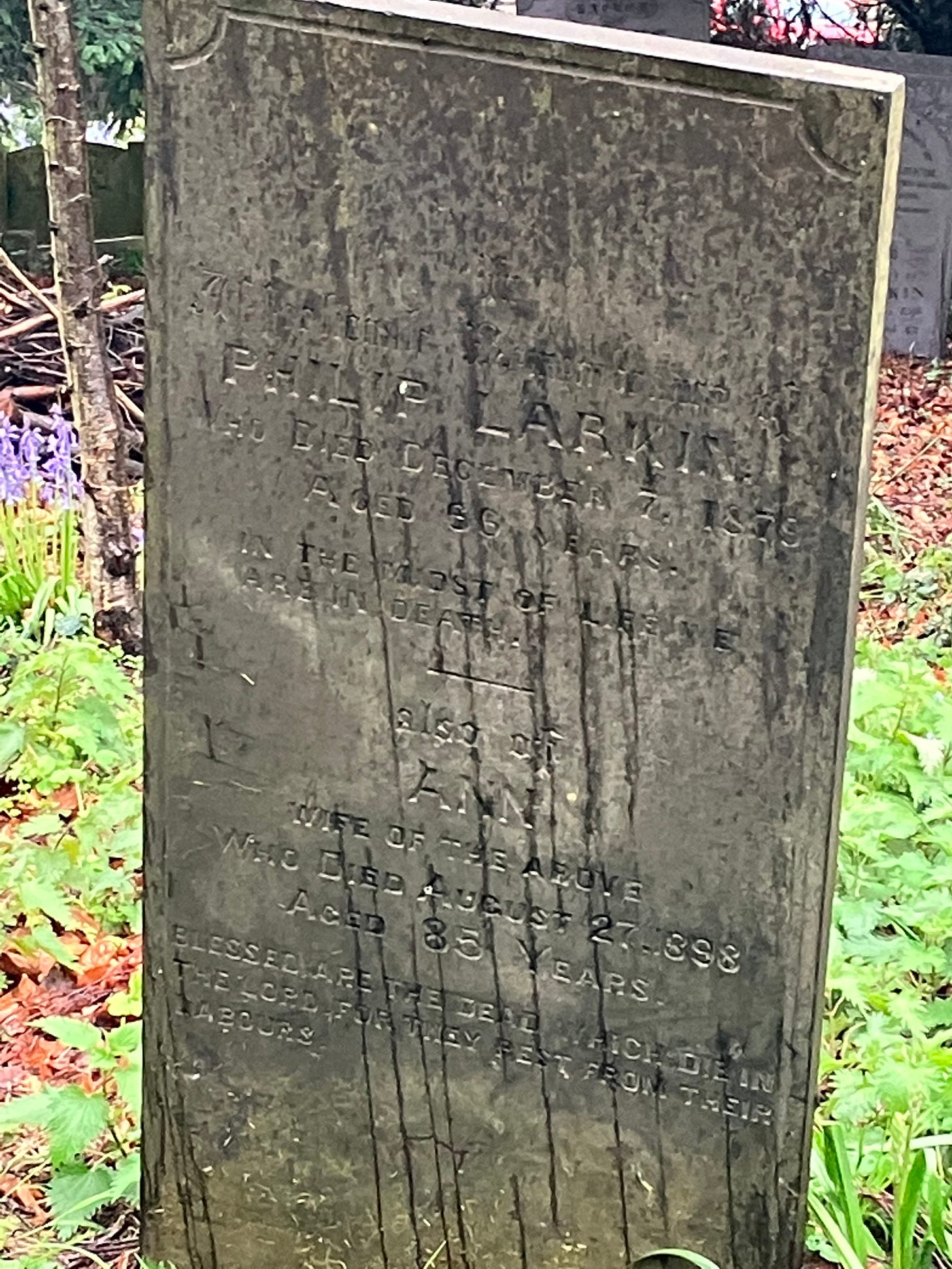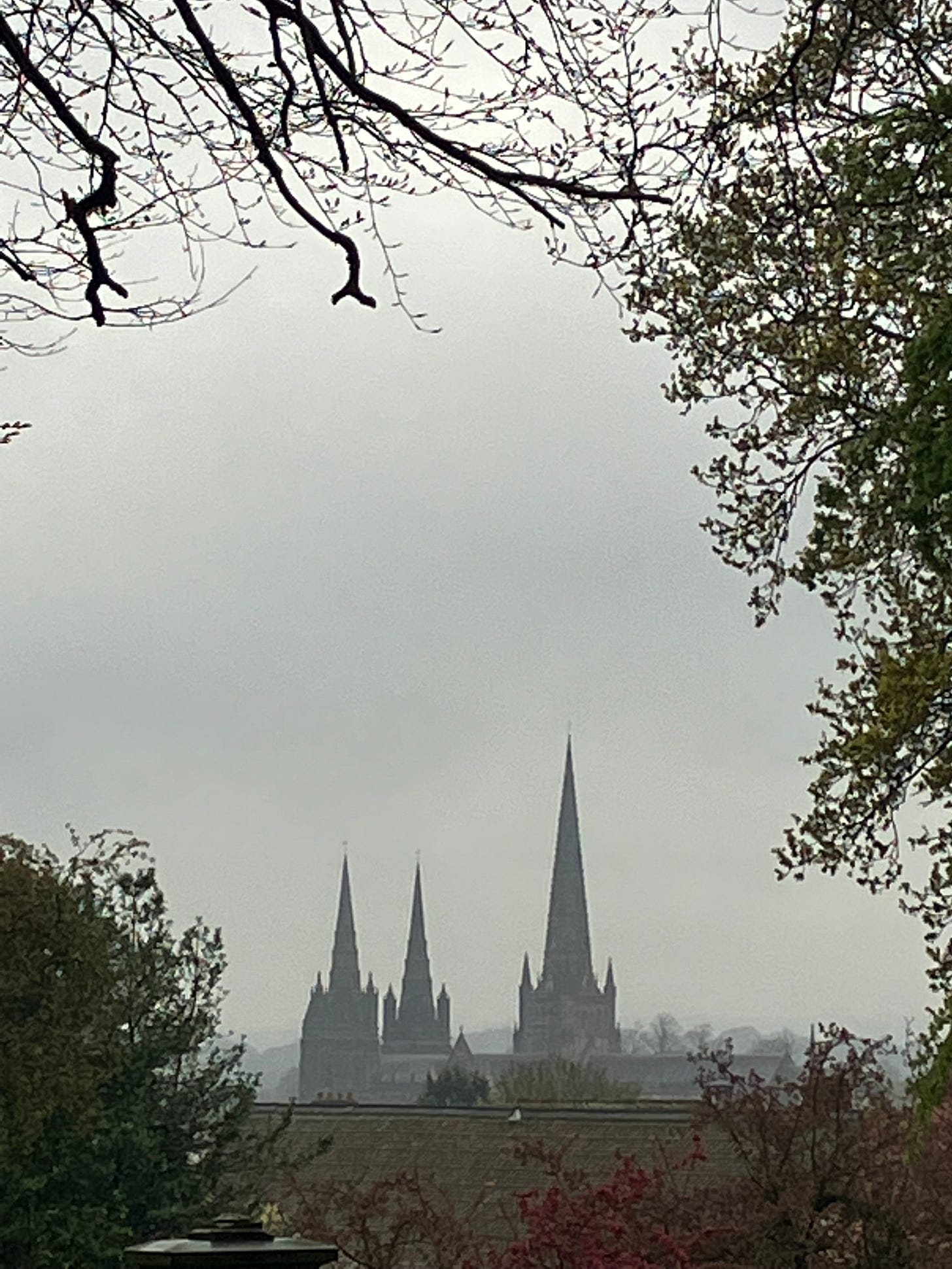Lichfield notes
where wild garlic abounds and bluebells sprout from the graves
Lichfield is one of the best places I have visited in the UK. It has a truly magnificent cathedral, the Samuel Johnson Birthplace Museum, Erasmus Darwin’s house, many lovely old streets, two splendid bakeries, and an ancient nine-acre churchyard. I came across this building, the Cruck House, right in the middle of a lot of suburban dross.
The Johnson Birthplace Museum is on the west corner of the market square, near St Mary’s church, now a library and cafe. This is not the church where Johnson’s family worshipped, though he was baptised there, because St Mary’s fell into a state of disrepair, and in 1716 the spire collapsed, the church was demolished and a new building (not the one there now) was begun. So Johnson’s family went to St Michaels, a mile away.
St Michaels is a large church with a nine-acre churchyard, supposed to be ancient like Lindisfarne and Glastonbury, where wild garlic abounds and bluebells sprout from the graves. Philip Larkin grew up in Lichfield and his parents are buried in this churchyard; there is a grave for an earlier Philip Larkin which the young poet saw at a funeral, telling a friend it made him want to run off and be sick in a Homburg hat. A little joke, but as someone once said of Larkin, eventually the iron entered the irony—the laughter soon became a howl. As he wrote in Aubade,
the dread
Of dying, and being dead,
Flashes afresh to hold and horrify.
St. Michaels is a splendid way to approach Lichfield as it has a clear view from its hill of the three spires of the cathedral. Arrive, therefore, not at the city station but at Lichfield Trent Valley and walk into the town. I was fortunate to meet three women preparing a flower display in St. Michaels who pointed out the graves and showed me where Johnson’s father is buried, right in the middle of the nave. When Johnson lived here the churchyard had no wildflowers but was used as pasture for sheep. This church looks medieval, and the tower is authentic, but it is mostly Victorian patchwork, though nicely done.
Lichfield Cathedral is from the thirteenth century with some gorgeous decorative work inside, especially the nodding ogees in the choir. Some of the nineteenth century tombs are magnificent replicas of the decorative style. In the civil war, the cathedral was sieged more than once by both sides and was ruined, so a lot of the outside and the roof is restoration by George Gilbert Scott.
Lichfield’s employment and wage data are strong and people report high levels of overall life satisfaction. Everywhere I went, people were cheerful, well-informed, and proud of their town. In the Oxfam bookshop, one volunteer regretted they had no Pevsner, offered to bring hers in tomorrow, and then made an irritated, off-hand remark about the way he had started using too many adjectives in the later volumes (Staffordshire being the last one Pevsner wrote.)
A good sign that you are in the one of the better market towns in England is eccentricity. (Lichfield is in fact a city but it has the character of a market town.) One volunteer I encountered spoke rapidly, and often to herself, making no change in tone or volume whether she was involved in self-chatter or addressing someone directly. When I arrived she alternated between answering questions and talking herself through some sort of pricing gun she was adjusting a set of numbers on, and she dropped the phrase, “Oh I didn’t carry the one—who doesn’t carry the one?”, right into the middle of something she was saying to me. All the volunteers were the best sort of advert for their town.
In an antique/junk shop, a bearded, ponytailed proprietor was holding forth as I walked in:
Well it depends what junior doctor means. It could mean just under consultant, in which case they’re earning a hundred grand already, or it could mean they’ve only just qualified, but if they’re only just qualified, well what do they think newly qualified lawyers and teachers make?
The proprietor’s index finger and thumb were pushed very tightly together as if they had once been squeezed in a vice and had ever since been unable to separate from each other, and he continued:
I started as a lawyer and I know exactly how much I was making when I began and exactly how much I was making after ten years and call me old-fashioned but it used to be that 1) you would be grateful to be in a profession when it was rare for people to have that, when it was rare for people to go to university, and there was this thing called delayed gratification that you’d start off not earning that much but then if you were still there after ten years you’d start overtaking everyone else…
Any reader wondering what point 2) was will be disappointed—this style of rhetoric is all delay, no gratification. I took a moment to look at a dusty and rather grubby set of Dickens (a staple of all such shops) and left during a polemic on what students have to realise about all the fun and drinking and things that shan’t be named in polite society involved at university.
Like all English market towns, Lichfield has an award-winning butcher. There is also a large independent music-store, a small shop selling card games like Pokemon and Magic the Gathering, and several decent second-hand book shops. I snuck through the open door at the guildhall and saw the jail, closed that day for a wedding. There were fresh fruit and vegetable stalls in the market and towards the end of trading one seller’s endless obnoxious cry—two packs of strawberry for a pound! come on two punnets for a pound of strawberry—sounded faintly like those religious fanatics who stand on the street with microphones reminding us all that the end is nigh.





Worked there as a youngster as a newspaper reporter in the late 60s. It had a flourishing weekly paper and two evening papers had branch offices there. There were two Councils (City and Rural District). There was a be-wigged Recorder (George Cuthbert Heron QC) with his own Quarter Sessions Court who paraded through the streets 4 times a year accompanied by the Mayor and Aldermen plus all the barristers in their gowns and led by his Clerk carrying a large mace. He dealt with the offenders who were deemed too heinous for the lay Magistrates at their weekly session. With its three-spired Cathedral and a Close with echoes of Barchester, numerous beamed alehouses and two grammar schools Lichfield seemed to have hardly changed since the days of Johnson, Garrick and Erasmus Darwin. It was a lively news area for we young reporters. The 1970s put paid to most of its colourful local autonomy through reorganisation of local Government and the justice system - it's hard to believe that there have been any material advantages from the changes but the the City has certainly lost character and influence.
I was there yesterday, and wish I’d read your newsletter beforehand. Now, I’ll have to go back!